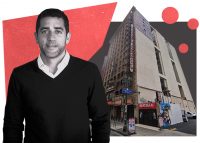The status of a privately funded venture to provide shelter to homeless people was settled Aug. 11 by a Los Angeles City Council committee.
The five-member Homelessness and Poverty Committee voted unanimously to explore options for a city master lease for The Cecil Hotel in downtown Los Angeles. The historic building, located at 640 South Main Street, has been redeveloped to provide permanent housing for formerly unsheltered people.
Under a proposed master lease deal, the hotel would become a lessor and the city the lessee. Individual tenants would sublease from the city, and the city would contract with a service provider for onsite case management in its units.
The structure is intended to cut red tape to move people into The Cecil by postponing paperwork until after a person moves into the building, according to people familiar with the deal at city hall and The Cecil.
Currently, only 73 of the hotel’s 601 rooms are occupied. Matt Baron, a Cecil owner and president of Baron Property Group, said all the units should be ready for occupancy around mid-September. In a recent interview with The Real Deal, he forecast that the rooms will be leased by the end of the year. He explained there was a delay in getting the voucher program up and running, but now referrals have picked up and property managers are showing the units.
The Cecil is an unusual project because it is among the largest buildings and privately funded projects devoted to giving a permanent address to unhoused people.
Previous owners of The Cecil had been criticized for operating a luxe hotel called Stay at Main at the building. Stay at Main closed in 2014. Baron Property Group acquired the building and its ground lease in a joint venture with Simon Development. Project critics had contended that Baron had been slow in preparing the building for formerly unhoused tenants. In June, Baron signed covenants to devote the entire building to affordable housing for the next 55 years.
The urgency of the homelessness crisis was raised during a hearing on a separate item during the committee meeting. Kevin De León, the committee chair, heard testimony on dropping the Project Roomkey program. Roomkey is a government program to give temporary shelter to the homeless in hotels during the COVID crisis. It was originally scheduled to end last September, but got extended a year, meaning the people in those hotel rooms could be on the street next month.
Chiefs of the Los Angeles Homeless Authority and Housing Authority of the City of Los Angeles testified about their groups’ plans to move people out of the hotels and into permanent housing.
“This is like Dunkirk,” De León said about the World War II disaster. “People are left on the beach and we need to get them.”
Douglas Guthrie, CEO of HACLA, said that more unhoused people than ever have access to vouchers – more than 7,000 tenant-based vouchers are currently in circulation to help with permanent housing. However, a voucher does not guarantee success in finding a permanent shelter. A rental market with low inventory slows down matching people to apartments.
The testimony on red tape and the slow pace of finding shelter met with frustration by committee members. “It’s like winning the lottery, waiting for that one unit to open up,” De León said.
Read more



